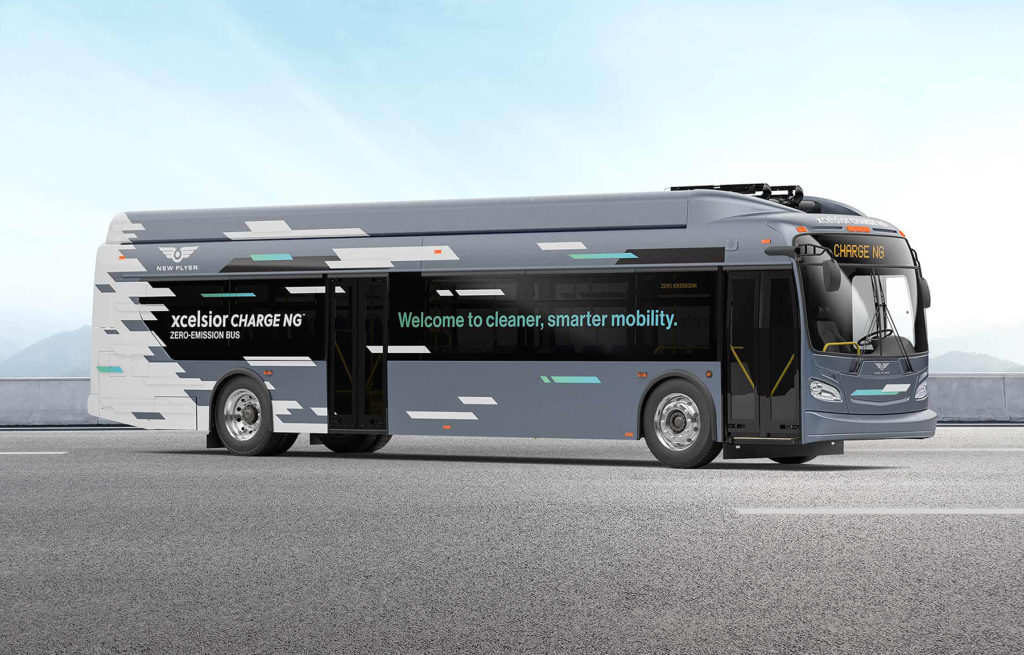In The News
New Flyer Unveils its Most Advanced EV Bus
Published by Electric Vehicles Research

New Flyer of America Inc has unveiled its next generation battery-electric Xcelsior CHARGE NG heavy-duty transit bus, built on the proven Xcelsior platform. Based on North America’s first low-floor transit bus introduced by New Flyer in 1991, the Xcelsior was launched in 2009, with over 16,000 delivered to date. Having surpassed 4.5 million service miles with its battery-electric Xcelsior CHARGE and fuel cell-electric Xcelsior CHARGE H2 buses, New Flyer applied the best of zero-emission design, performance, research, and ingenuity to develop its newest electric bus. For further information see the IDTechEx report on Electric, Hybrid and Fuel Cell Buses 2021-2040. New Flyer’s Xcelsior CHARGE NG incorporates three distinct technology advancements to deliver a high-performance bus, including next generation high energy batteries that extend range up to 13%, advanced protective battery packaging designed for easy install and simpler serviceability, and a new lightweight electric traction drive system with up to 90% energy recovery.
“The Xcelsior CHARGE NG harnesses the best technology on the market. It includes a streamlined design that reduces maintenance, increases energy density, and improves energy recovery while significantly reducing weight – offering a lighter, more energy efficient, and longer range electric bus,” said Chris Stoddart, President, New Flyer and MCI. “As EV demand continues to build, so too has our innovation. With better manufacturability, higher energy recovery, fewer parts, and improved system durability, our Xcelsior CHARGE NG is a high-performance bus that is more sustainable and easier to maintain.
“New Flyer manufactures its own batteries in its bus production facilities. The battery packaging, developed by New Flyer, utilizes single waterproof enclosure design and offers weight reduction and simpler maintenance, decreasing the number of parts by 90%. Its streamlined approach also allows technicians to simply “plug in” or “unplug” individual battery packs, significantly reducing bus downtime and allowing easy replacement as needed in future.
High energy, long range batteries utilize an active liquid cooling system to maintain temperature and respond quickly to increases in power demand and environmental loads. The batteries are also better insulated, lending optimal temperature maintenance, prolonged battery life, and greater power efficiency. Finally, the Siemens ELFA 3 traction system delivers up to 90% energy recovery and weighs 69% less than ELFA 2, allowing greater passenger capacity and lending more efficient design through compact inverters and embedded drive controllers.
“Millions of people count on us every day, whether for reaching their destinations or expecting the highest quality from our technology,” said Jennifer McNeill, Vice President of Public Sector Sales and Marketing. “This is why, alongside vehicle technology advancements, we have evolved our manufacturing and field services processes to ensure a safe, reliable, scalable approach to be ready for tomorrow’s growing electric bus demand today. In turn, we also enhanced training for our teams and those of transit agencies across North America; enabling EV adoption while supporting continuous workforce development to drive the new mobility era.”
Related
In The News
Large New York Order for New Flyer
Read More
In The News
NFI subsidiary New Flyer awarded two contracts from New York for up to 2,090 Xcelsior® transit buses
Read More
In The News
New Flyer sells +200 e-buses in New York (with options for further 1,200)
Read More